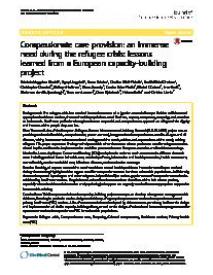Compassionate care provision : an immense need during the refugee crisis : lessons learned from a European capacity-building project
Background:
The refugee crisis has resulted in massive waves of migration towards Europe. Besides sufficient and appropriate healthcare services, these vulnerable populations need kindness, respect, acceptance, empathy, and attention to basic needs. Healthcare professionals ought to have a respectful and compassionate approach to safeguard the dignity and interests of the people they care for.
Aim:
The overall aim of the European Refugees-Human Movement and Advisory Network (EUR-HUMAN) project was to provide good and affordable, comprehensive, person-centred, integrated and compassionate care for all ages and all ailments, taking into account the transcultural settings and the needs, wishes and expectations of the newly arriving refugees. This paper reports on findings to help establish what the nature of compassionate care for refugees consists of and implies and how its implementation could be promoted across European countries and healthcare settings.
Methods
A two-day Expert Consensus Meeting (ECM) took place in order to reach consensus in different thematic areas including cultural issues in health care, continuity of care, information and health promotion, health assessment, mental health, mother and child care, infectious diseases, and vaccination coverage.
Results:
Notably, all experts stressed the need to address mental health problems. Interactions and input received during the meeting highlighted the urgent need for compassionate care for these vulnerable populations. Additionally, the needs reported by refugees and other migrants helped identify a serious gap in terms of compassionate attitudes exhibited by healthcare workers. Linguistic and cultural barriers exacerbate the effect of the lack of compassion, especially where healthcare information and psychological support are urgently needed but an appropriate supportive framework is missing.
Conclusions:
This European collaborative capacity-building project attempts to develop a long-term strategy to tackle this issue, focusing in particular on the design and delivery of appropriate person-centred and compassionate-based primary healthcare (PHC) services. A list of recommendations developed by this consensus panel may facilitate the design and implementation of similar capacity-building efforts, as well as the design of educational intervention programmers for a person-centred and compassionate PHC for vulnerable populations.
In: Journal of Compassionate Health Care, ISSN 2053-2393 | 5 | 2
https://doi.org/10.1186/s40639-018-0045-7


